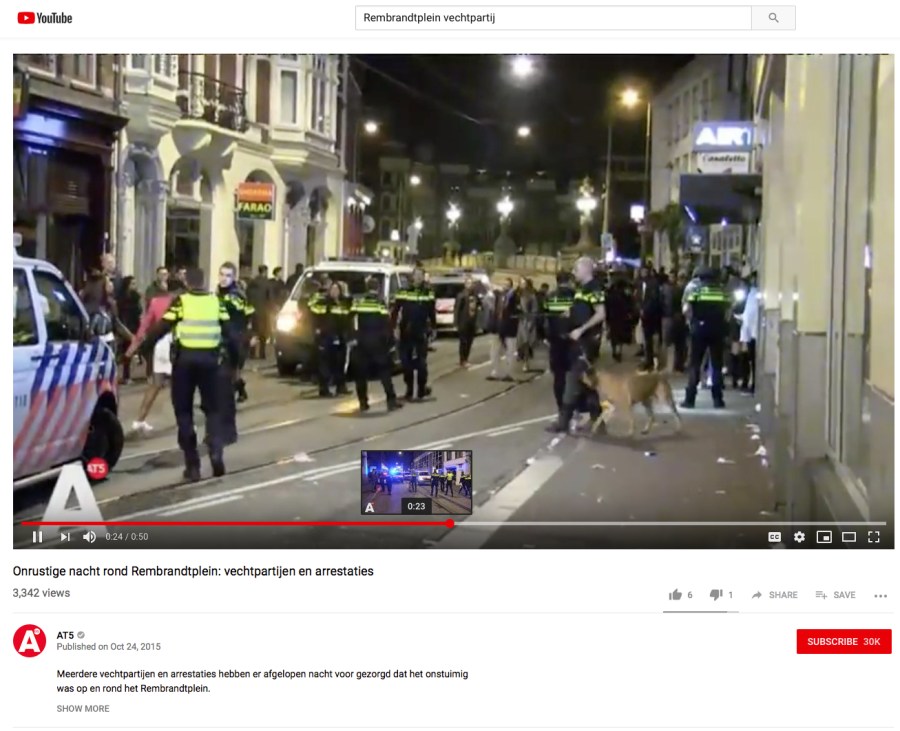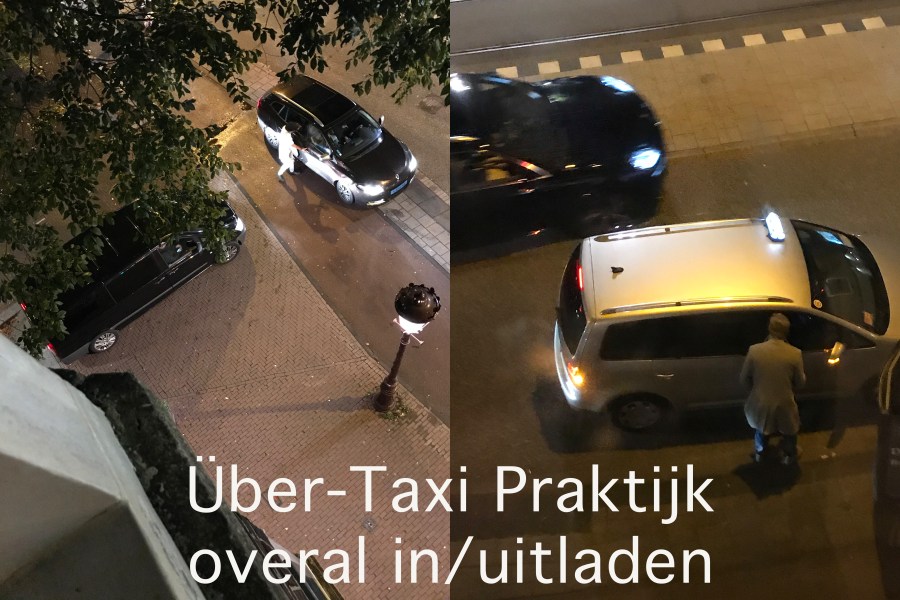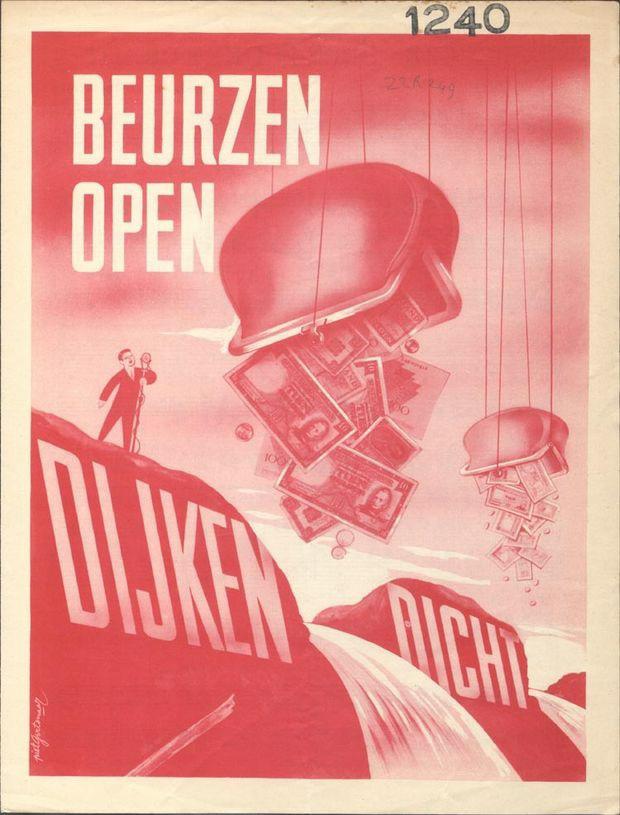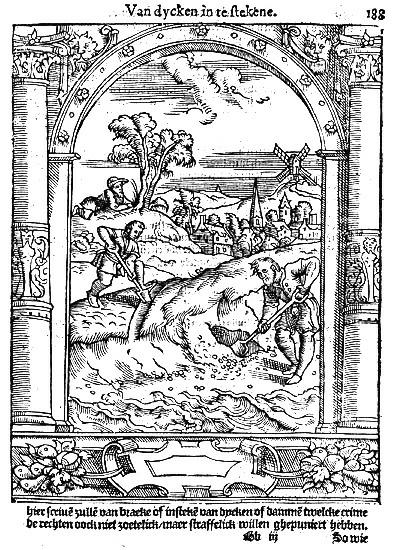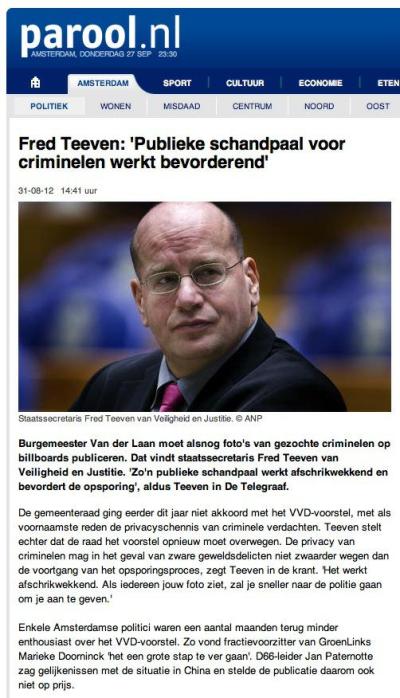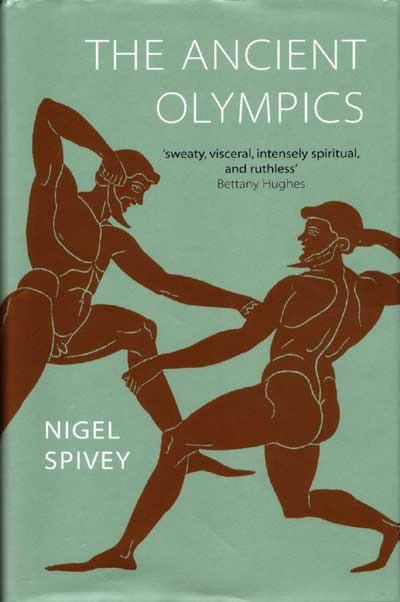
De hele idee van het kiezersmandaat – in zijn huidige vorm – is altijd al een probleem geweest en gebleven. Zo is er nu het voorstel van de 2e kamervoorzitster Gerdi Verbeets (PvdA) om na de val van een kabinet gewoon door te regeren en de volle 4 jaar af te maken, iets waar nog weinigen zich direct en publiekelijk tegen gekeerd hebben. Arrogantie van “volksvertegenwoordigers”, in een nog verdere gaande structurele vorm dan al die verliezende partijvoorzitsters en -zitters die allen zeggen gewoon aan te blijven.
Jolanda Sap leek mij ooit iemand die wel goed haar huiswerk deed als kamerlid (1), maar als lijsttrekker toont zij weinig begrip voor de ‘demos-kratos’ – al was het maar in de gefingeerde vorm van ‘onze’ parlementair stelsel.
Zij zegt zich gesterkt te voelen in haar overtuiging ondanks het eclatante verlies van GroenLinks en gewoon als partijvoorzitsters aan te blijven.
GroenLinks kamerlid van voor deze verkiezingen Rick Grasshold wordt geciteerd in Het Parool van 14 september, een artikel met de veelzeggende kop “Sap blijft – er is niemand anders”:
“Wat moet ik zeggen? We hebben echt tot het uiterste campagne gevoerd, maar het resultaat is er niet naar. Ik weet het even niet meer.”
Het is ook niet de campagne en de wijze waarop die gevoerd is (zoals een aantal hoogleraren in politiek en communicatie in de dagen vlak voor de verkiezingen nog verzuchtten in de Volkskrant), het is – heel simpel – het gevoerde beleid van GroenLinks in de afgelopen ‘jaren’, dat te ver afgedreven was van het vaste land van de daadwerkelijke trouwe GroenLinks-stemmers.
Sap prijst zichzelf altijd als iemand die tegen de stroom oproeit en pas bij tegenwind in vorm komt.
“Wij zijn zelf zo wie zo buitengewoon gemotiveerd om heel scherp te gaan controleren. We zullen ook zelf regelmatig ter plekke gaan kijken, er zijn goeie contacten in Afghanistan en we zullen de achterban daar ook heel goed bij gaan betrekken en op de hoogte houden.” (1:02)
Aldus Jolande Sap na haar eerste GroenLinks Congres in Utrecht, zaterdag 5 februari 2011 sprekend in de NOS microfoon. “Goeie contacten in Afghanistan”, je vraagt je af hoe ver de contacten en expertise van partijleidster Sap wel niet reiken, zou dat bij de lokale bevolking zijn of gewoon een persvoorlichter binnen de muren van één van de forten van NATO of ISAF? Terug naar dat congres…
Het was een schizofreen congres dat enerzijds “een motie van treurnis” aannam over de steun van de Tweede Kamerleden van GroenLinks voor het regeringsbeleid, dat een ‘politionele missie’ in de provincie Kunduz in Afghanistan ondernam. Een congres waar jonge vredesactivisten een ludieke actie tegen dit GroenLinks besluit voerden, met nep-politieagenten die het congresgebouw beveiligden. Een congres dat pal daarvoor – echter wel – een ‘motie van afkeuring’ verwierp die de kersverse partijleidster van het podium gestoten zou hebben.
Toch blijft dat niet met de oorsprong van GroenLinks strokende beleid van het steunen van Nederlandse deelname aan militaire acties, doorvreten. Eén van de vijf partijen die ooit tot GroenLinks fuseerden was de PSP, ofwel de Pacifistische Socialistische Partij. Zo komt op hetzelfde NOS verslag van het congres een wat oudere man (Paulus de Wilt is mij later verteld tj.) in beeld (0:52) die zegt:
“Ik ben 21 jaar lid van GroenLinks, de partij zit in mijn hart, ik heb er ontzettend veel moeite mee dat dit gebeurd, maar ja het is niet anders, je hebt het af en toe accepteren.”
Dat klinkt dan weer als een houding die haar oorsprong vindt in weer een andere wortel van GroenLinks, de CPN, ofwel de Communistische Partij Nederland, waar het onderschikt maken van het ‘persoonlijk gevoelde’ aan een hoger, door de partij bepaald belang, een vanzelfsprekendheid was, ongeacht de kille tegenwind van de Koude Oorlog.

Op de Indymedia.nl web site stond dit verslag van het protest tegen GroenLinks Kundus steun:Eerste Dwaze Training Kunduz Politie bij GL. De Politie van Kunduz zou ergens op de planeet les moeten krijgen. Geen betere plek op zaterdag 5 february dan het congres van GroenLinks in Utrecht! Rond 10.30 uur kwamen de eerste recruten opdagen en probeerden ze voor de eerste keer in hun leven een gebouw veilig te stellen waar (je weet maar nooit!) Taliban zich zou kunnen verschuilen. Helaas was de coördinatie met andere geuniformeerde krachten nog niet helemaal zoals het zou moeten zijn…Verschillende pogingen om de zaal binnen te komen, faalden op ‘n dramatische wijze. Veligheidstypes wisten niet van de nieuwe, belangrijke missie en duwden het bataljon van de Kunduz Politie uit het gebouw. De enige overgebleven mogelijkheid was om door te gaan met onze dwaze training buiten het gebouw. Gelukkig was er professionele ondersteuning van de Nederlandse politie uit Utrecht – die het heerlijk vonden om met ons te oefenen! Met hun spelen was echt dikke pret!We weten dat de volgende Nederlandse bijdrage aan een NATO-missie niet erg goedkoop is: het begint met 500 miljoen Euro. Maar dan krijg je ook iets heel moois! We leerden bijvoorbeeld de typisch Nederlandse polonaise en zongen: “Olé, olé, olé – we gaan naar Kunduz – we gaan naar Kunduz!” (2)
Dan komt op 26 april 2012, vlak na de struikeling van kabinet Rutte I – in de tuin van het Catshuis – over het uitgestoken been van Geert Wilders, de reddende hand van de gelegenheids-coalitie van D66, GroenLinks en de Christen Unie, die ten val gebrachte gedoogregering nog even overeind helpt. Dit in een zelfde combinatie die destijds de regering Rutte aan een meerderheid hielp voor voortzetting van de ‘politionele actie’ in de Afghaanse provincie Kunduz.

Verdraaiing van mijn hand van een krantenkop in de Volkskrant vlak naar het sluiten van het zogenaamde ‘Kundus-akkoord’ waarbij gewag gemaakt van een ‘lente-offensief’ van de Taliban in Afghanistan, wat ik dan voor mijn geestesoog zag als oprukken over de onderhandelingstafel in de fractiekamer van D66 op het Binnenhof. NB ‘kurduz-coalitie’ c.q. ‘kurduz-akkoord’ ook wel ‘wandelgangenakkoord genoemd: “Er zijn verschillende namen voor het akkoord. De term wandelgangenakkoord is ontstaan doordat minister De Jager van Financiën en de fracties in de Tweede Kamer voortdurend heen en weer liepen door de wandelgangen van het Tweede Kamergebouw. Vandaar de naam wandelgangenakkoord. GroenLinks noemde de partijen die het met elkaar eens waren de regenboogcoalitie. De partijen trokken eerder samen op toen het ging om de politietrainingsmissie in de Afghaanse provincie Kunduz. Vandaar dat deze coalitie ook wel de Kunduz-coalitie wordt genoemd.”[citaat van een Nederlandse Wikipedia pagina die in mei dit jaar genomineerd is om verwijderd te worden, met ander woorden het was toen een nog ‘zwevende term’]
Vandaar ‘Kunduz-coalitie’ (ondanks pogingen van CDA Minister De Jager om het wat vriendelijker ‘Lente offensief ‘ te noemen). Maar liefst 16 miljard Euro aan ‘ombuigingen’ en lastenverzwaringen, worden in dit begrotingsakkoord vast- en voor het jaar 2013 opgelegd. Ook dit moet een deel van de achterban van GroenLinks verbijsterd hebben. Zo niet het partijbestuur, die steeds ‘Realpolitik’ boven ‘oppositie’ blijkt te verkiezen. Een partijbestuur dat willen laten zien – om met Femke Halsema op het GL-Congres van 28 november 2009 te spreken –
“GroenLinks is klaar om te regeren.”
Een veelvoud aan verwijderingen bij GroenLinks voltrekt zich: tussen GroenLinkse kamerleden onderling (de potsierlijke ‘partijleider’ verkiezingen), tussen kamerfractie en partijbestuur, als ook tussen partijbestuur en partijleden. Dit alles leidt dan uiteindelijk tot de vervreemding van potentiële kiezers van “hun partij”, die iets anders is geworden dan dat wat zij als GroenLinks kenden.
De afstraffing van GroenLinks in de jongste verkiezingen is zeker ook toe te schrijven aan deelname van GroenLinks aan dit tussendoor geflanste Kunduz-akkoord, dat sommige commentatoren “een huzarenstukje” noemden (FritsWester/RTL Nieuws) maar bij de achterban klaarblijkelijk gezien werd als een verwerpelijk ‘monsterverbond‘.
Het is niet enkel GroenLinks dat te lijden heeft gehad van getoonde ‘regeringskoorts’ tijdens de 2012 verkiezingsstrijd. Ook de SP heeft dit moeten ervaren, alhoewel deze partij zichzelf niet op gelijke wijze als GroenLinks gecompromitteerd had door de ondersteuning van het Kabinet Rutte I. Anders dan bij de SP kon er bij GroenLinks geen sprake zijn van een gedroomde ‘grote voorsprong voorwaarts’ van oppositie- naar meerderheids-regeringspartij. De GroenLinks strategen moeten het verdeelde politieke landschap dat de 2010 verkiezingen opleverden, voor ogen hebben gehad, waarbij regeringsmeerderheden van gelijkgezinden niet of nauwelijks te vormen waren. Door zich het lot van het gevallen kabinet Rutte I aan te trekken, dachten deze strategen, hun eigen droom van regeringsdeelname (Halsema 2009) te kunnen verwerkelijken. Overwaardering van wat een kleinere fractie in een regeringscoalitie vermag te weeg te brengen, gekoppeld aan een onderschatting van het effect van oppositie bedrijven.
De teloorgang van grote gelijkgestemde regeringscoalities openbaart zich al gedurende bijna twee decennia, een gegeven dat de betekenis van ‘oppositie partijen’ veranderd heeft, van machteloos toezien, tot actief tussenbeide komen. De betekenis van het recht van een ieder Kamerlid om het initiatief te nemen om een wetsvoorstel in te dienen is de laatste decennia ook ingrijpend veranderd. Vond dit in de regeringsperiode 1945-1967 nog slechts 8 x plaats, in de periode 1973-1990 was dat opgelopen tot een aantal van 67 initiatieven. Tegenwoordig heeft ook de oppositie recht op ambtelijke ondersteuning bij het opstellen van zulke initiatieven. Dus oppositie is al lang meer dan enkel lijdzaam toezien. Daarbij moet ook gerekend worden het recht van amendement van ieder kamerlid – al dan niet deelnemend aan de regering – op regeringsvoorstellen. Sterker nog, met minderheidscoalities (zoals de VVD/CDA gedoogconstructie met de PVV) en heterogene coalities zoals Paars (VVD/PvdA/D66) en met de mogelijke herhaling van dat coalitiemodel, komen besluiten meestal tot stand en worden zij vaak gewijzigd door wat heet ‘shoppen’ van de regering voor een kamermeerderheid per ingediend voorstel. Niet enkel in de Tweede, maar ook in de Eerste Kamer.
Een partij als GroenLinks verzwakt enkel zichzelf als zij kiest voor regeringsdeelname. Het getalsmatige machtsspel van ‘een meerderheid is de helft + 1’ biedt in het huidige politieke bestel van Nederland voor kleine partijen meer kansen vanuit de oppositiebanken dan op het regeringspluche. Op basis van het partijprogramma kiezen welke thema’s gesteund en welke bestreden worden. Dat maakt dat het door de kiezers gegeven mandaat niet verkwanseld hoeft te worden en het bestaansrecht van zoiets als GroenLinks tijdens een regeringsperiode bewezen kan worden.
Het is de herinnering van wat al gedaan is en niet de beloften van de toekomst die bepalend zijn voor kiezersgedrag. In die zin zou het GroenLinks logo met de leuze “zin in de toekomst” aanpassing verdienen.

Links het huidige logo van GroenLinks, rechts een affiche-ontwerp van Diana Scherer dat zij in opdracht van de VPRO om eens een ander beeld te geven van een partij, in het jaar 2010 maakte (3)
————-
(1) Sap stelde in een vroeg stadium kamervragen over de oplichtingspraktijken van Dirk Scheringa en zijn DSB bank (aangeizen de link van het Ministerie van Financiën verdwenen bleek, hierbij de volledige tekst uit mijn documentatiesysteem, om een indruk te geven van de grondige werkwijze van Jolande Sap als kamerlid in de periode dat Femke Halsema de fractie leidde:
Antwoorden op kamervragen kamerlid Sap hypotheken DSB Bank
Kamervragen | 18-05-2009 | Kredietcrisis
De voorzitter van de Tweede Kamer der Staten Generaal
Postbus 20018
2500 EA Den Haag
Datum 18 mei 2009
Ons kenmerk: FM09-960
Betreft Kamervragen SAP
Geachte voorzitter,
Hierbij zend ik u de antwoorden op de vragen gesteld door het lid Sap (GL) over hypotheken van DSB Bank.
Hoogachtend,
de minister van Financiën,
Wouter Bos
1) Bent u bekend met de uitzending van Tros Radar van 13 april over hypotheken van de DSB Bank?
Ja
2) Bent u bekend met het bericht “AFM: Maak een einde aan tophypotheek”
Ja
3) Is het waar dat er een groot aantal hypotheken is verstrekt van boven de 125% van de executiewaarde van een huis? Zo ja, hoeveel zijn dit er en door welke banken zijn deze verstrekt?
Recente exacte cijfers zijn niet bekend. Uit cijfers van het onderzoek woON (2006) blijkt dat 68% van de koopstarters een Loan to Value (LTV) van meer dan 100% heeft, terwijl het gemiddelde van alle eigenaren op 21% ligt. Wat betreft Loan to Income (LTI) heeft 20% van de koopstarters een LTI van meer dan 5,0, terwijl het gemiddelde van alle eigenaren op 9% ligt in 2006.
4) Is het waar dat dit een structurele overtreding is van de gedragscode hypothecaire financiering?
Nee. De Gedragscode Hypothecaire Financieringen (GHF) bevat niet zulke exacte voorschriften hierover. Op dit moment is namelijk vastgelegd in de code dat ten aanzien van hypotheken op inkomen getoetst moet worden. Er hoeft niet op LTV, de verhouding van het krediet t.a.v. de onderliggende waarde van het pand, te worden getoetst. Hiervoor geldt alleen een waarschuwingsplicht voor kredietverstrekkers. Maar DSB Bank dient wel te voldoen aan de (zorg)plicht om verantwoord krediet te verstrekken. Dit is een open norm die in de wet is opgenomen. Op dit moment wordt de open norm ingevuld door de GHF. De AFM houdt toezicht op invulling van deze norm door de sector, en dus ook op invulling van deze norm door DSB Bank.
Zo ja, bent u bereid deze gedragscode wettelijk te verankeren? Of hoe bent u anders voornemens hier tegen op te treden?
Dit is niet nodig conform het huidige wettelijke kader. De Wet op het financieel toezicht (Wft) bevat een verbod op overkreditering waarin een open norm is neergelegd.
Artikel 4:34 bepaalt dat de aanbieder geen kredietovereenkomst aan mag gaan met een consument indien dit, met het oog op overkreditering van de consument, onverantwoord is.
Het is in principe aan de aanbieder van krediet om invulling te geven aan deze norm. In de lagere regelgeving (artikel 115 van het Besluit gedragstoezicht financiële ondernemingen) is bepaald dat de aanbieder zijn criteria voor kredietverlening vastlegt en deze toepast bij de beoordeling van een kredietaanvraag. Dit wijst er op dat de wetgever het ook in eerste instantie aan de aanbieder heeft over willen laten de norm in te vullen. In de praktijk heeft de sector hieraan invulling gegeven met de Gedragscode Hypothecaire Financiering. De AFM houdt toezicht op de invulling hiervan.
5) Wat vindt u van de uitspraken van de directeur van de AFM dat er geen hypotheken van boven de 100% van de woningwaarde meer verstrekt zouden moeten worden?
Het huidige voorstel van de AFM zou een aanscherping van het toezichtbeleid betekenen. In de regel komt dit beleid tot stand in nauw contact met het ministerie van Financiën, De Nederlandsche Bank en de sector. De AFM is voornemens om in mei het voorstel te concretiseren en nader te onderbouwen met onderzoek. Het ministerie van Financiën zal in samenspraak met de ministers voor WWI en EZ het voorstel van de AFM bestuderen en hierbij letten op de maatschappelijke en economische gevolgen, en in het bijzonder op het voorkomen van ongewenste gevolgen voor de woningmarkt (zoals startersproblematiek, belemmering doorstroming en stagnatie in de woningbouw). Zoals de voorzitter van de AFM ook al meldde liggen in de huidige economische omstandigheden abrupte maatregelen niet voor de hand.
6) Hoe denkt u dat bij deze eventuele 100% norm zo goed mogelijk rekening gehouden zou kunnen worden met de positie van starters?
Zie antwoord op vraag 5.
7) Bent u ook van mening dat het aantal gevallen waarbij de norm van 4,5 keer het jaarinkomen wordt overschreden, teruggedrongen dient te worden?
Ja, in principe is in de Gedragscode Hypothecaire Financiering deze norm vastgelegd. De AFM houdt toezicht op invulling van deze norm door de sector. Als de AFM van mening is dat deze norm onvoldoende wordt gehandhaafd, kan de AFM sanctioneren. De AFM heeft aangegeven van plan te zijn stringenter toezicht te houden op naleving van deze norm.
8) Is het waar dat de DSB Bank provisies ontvangt van tot wel 85% van de koopsom van een polis? Zo ja, zijn er ook andere banken die zulke hoge premies ontvangen?
In de uitzending werden cijfers genoemd van 80 tot 85 % provisie voor de verkoop van een verzekering door DSB Bank. De huidige provisieregels gelden per 1 januari 2009 voor hypotheken en complexe producten. Op grond hiervan dient de provisie in verband met hypotheken vooraf transparant te worden gemaakt aan de klant. Verder moet deze provisie voldoen aan een inhoudelijke norm (inducement- norm). De provisie mag op grond daarvan niet te hoog zijn. De AFM houdt toezicht op deze nieuwe regels.
Exacte cijfers zijn ons niet bekend over andere banken.
8) Deelt u de mening dat alle in dit verband direct aan de koopsom gerelateerde provisiebetalingen, zoals “marketingbijdrages” en “winstdelingen” onder de regelgeving op het gebied van provisietransparantie zouden moeten vallen?
Daarbij wordt ook de vraag gesteld of een ‘gegarandeerde winstuitkering’ ook een provisie is. Binnen de provisieregelgeving worden alle betalingen van een aanbieder aan een tussenpersoon geregeld. Daarbij maakt de naam die op een dergelijke betaling wordt geplakt niet uit.
9) Bent u bereid zogenaamde kredietbeschermers (zoals een overlijdensrisicopolis), evenals “complexe financiële producten” ook onder deze regelgeving te laten vallen?
Er is momenteel een discussie gaande over de reikwijdte van de provisieregels. Een belangrijk punt daarbij is of deze regels van toepassing moeten worden op eenvoudige financiële producten zoals woonlastbeschermers en overlijdensrisico- en uitvaartverzekeringen. Daarom worden deze regels uiterlijk begin volgend jaar geëvalueerd. Dit is toegezegd aan uw Kamer d.d. 6 november 2009.
10) Deelt u de mening dat er een maximum gesteld moet worden aan de provisie bij bijvoorbeeld kredietbeschermers?
Het is niet de bedoeling om een maximum aan provisies te stellen, maar wel om te toetsen of een provisie niet in strijd is met het behartigen van het belang van de klant.
11) Bent u bereid aanbieders van bijvoorbeeld overlijdensrisicoverzekeringen te verplichten de kostenstructuur van deze verzekeringen openbaar te maken?
Zie antwoord op vraag 9.
12) Bent u bereid lopende het onderzoek van de AFM naar de tophypotheken van de DSB, de DSB te sommeren de invordering van deze schulden bij mensen die in grote betalingsproblemen komen op te schorten, in afwachting van de resultaten van het AFM onderzoek?
Deze bevoegdheid bezit ik niet. De AFM heeft van mij de bevoegdheid gekregen om, als toezichthouder op de financiële markten, te sanctioneren bij overtreding van overkrediteringsnormen. Voor het overige is het aan de bank en cliënten zelf om te proberen een oplossing te vinden voor hun onderlinge problemen. Hierbij kan het burgerlijk recht ook een rol spelen. DSB Bank heeft aangegeven zelf een regeling te willen treffen met de gedupeerden (Stichting Hypotheekleed).
13) Kunt u aangeven wanneer de Kamer de resultaten van het onderzoek van de AFM kan verwachten?
De AFM kan geen onderzoeksgegevens van individuele instellingen publiceren als dit vertrouwelijke toezichtsinformatie betreft. De AFM heeft wel mogelijkheden om een eventuele boete met het boetebesluit waarin de boete wordt toegelicht te publiceren.
Meer informatie
Brief aan de Tweede Kamer
18-05-2009 | PDF bestand, 34 Kb
(2) Indymedia.nl “Eerste Dwaze Training Kunduz Politie bij GL “
(3) Website Mediacultuur: VPRO verkiezingsaffiche voor GroenLinks gemaakt door Diana Scherer in 1010
Read Full Post »






